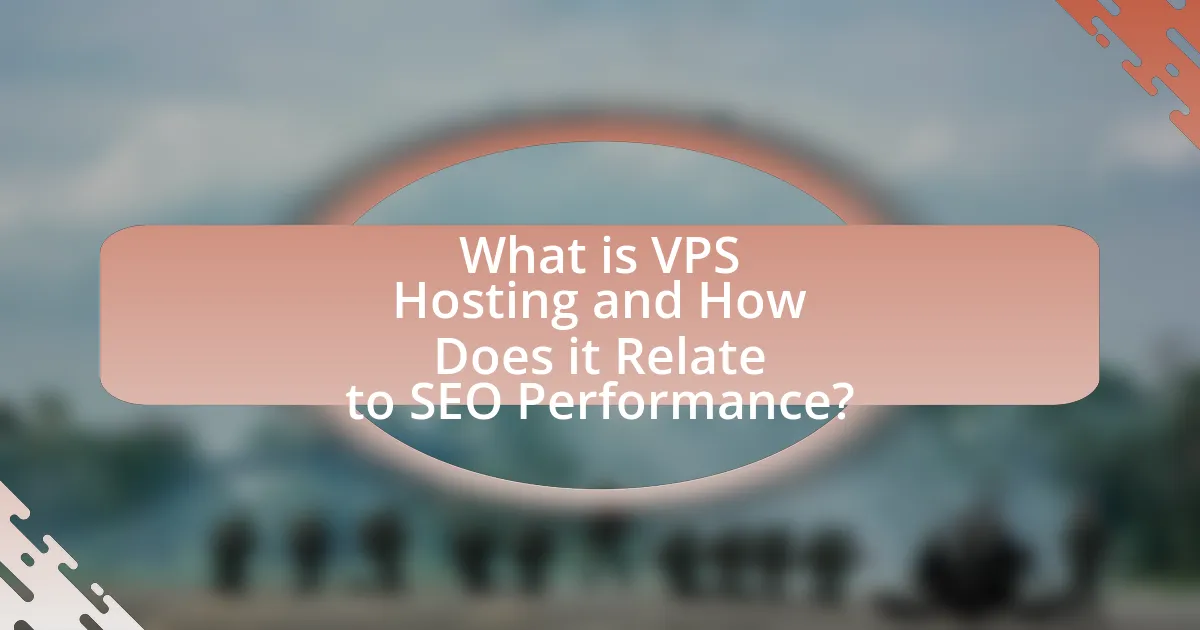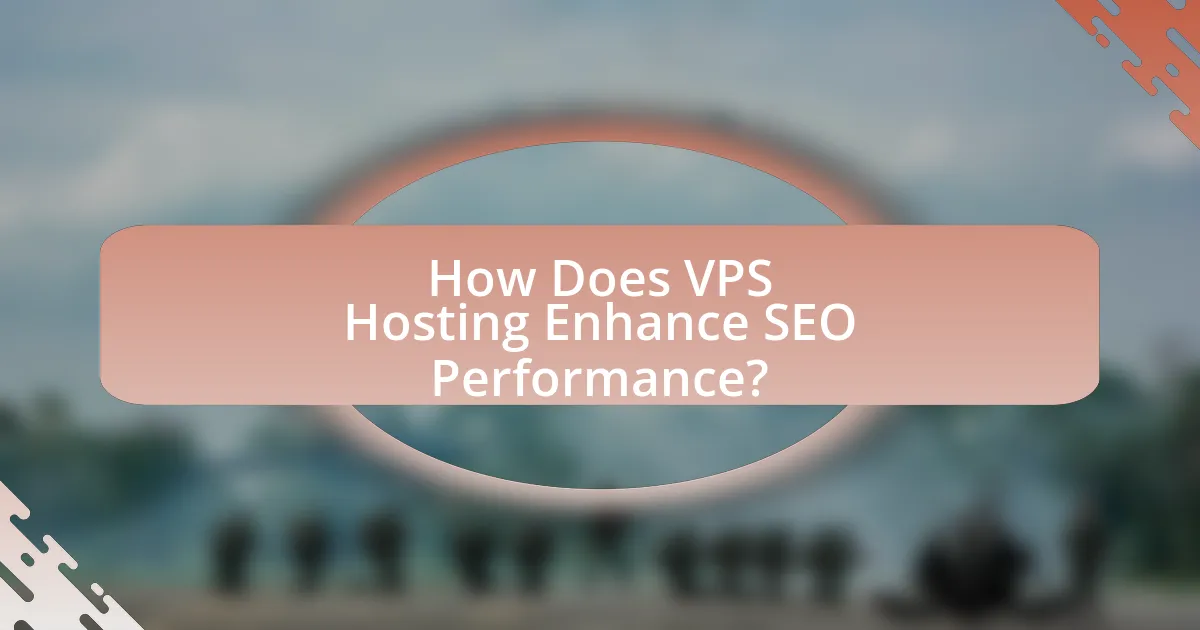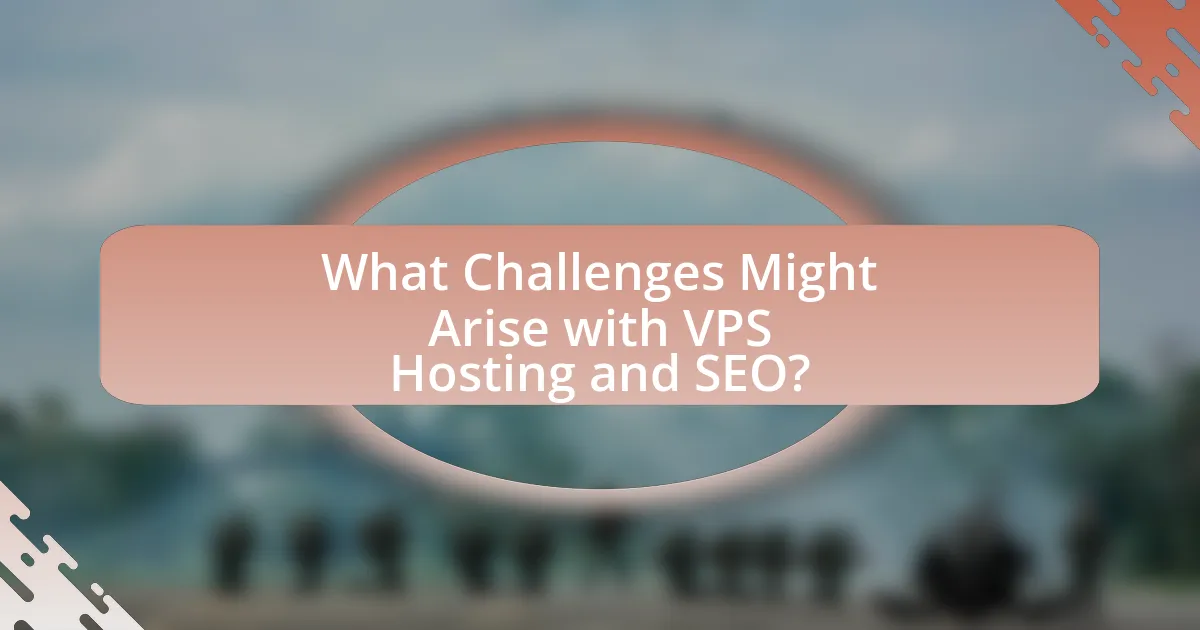VPS hosting, or Virtual Private Server hosting, is a web hosting solution that offers dedicated resources on a virtual server, enhancing control and customization compared to shared hosting. This article examines how VPS hosting can improve SEO performance through faster website loading times, enhanced security, and better uptime reliability. Key features such as dedicated resources and optimized server configurations are discussed, along with the impact of website speed and security on search engine rankings. Additionally, the article addresses potential challenges associated with VPS hosting and provides best practices for optimizing VPS configurations to support SEO efforts effectively.

What is VPS Hosting and How Does it Relate to SEO Performance?
VPS hosting, or Virtual Private Server hosting, is a type of web hosting that provides dedicated resources on a virtual server, allowing for greater control and customization compared to shared hosting. This hosting solution can positively impact SEO performance by offering improved website speed, enhanced security, and better uptime reliability. Faster loading times, which are crucial for user experience and search engine rankings, are often achieved through the dedicated resources of VPS hosting. Additionally, the increased security measures available with VPS hosting can protect websites from attacks, further ensuring consistent availability and performance, both of which are factors that search engines consider when ranking sites.
How does VPS Hosting differ from other hosting types?
VPS hosting differs from other hosting types by providing dedicated resources within a shared environment, allowing for greater control and performance. Unlike shared hosting, where multiple users share the same server resources, VPS hosting allocates specific amounts of CPU, RAM, and storage to each virtual server, ensuring that performance is not affected by other users. In contrast to dedicated hosting, which offers an entire server for a single user, VPS hosting is more cost-effective while still delivering enhanced performance and customization options. This unique resource allocation can lead to improved website speed and reliability, which are critical factors for SEO performance, as faster loading times and uptime positively influence search engine rankings.
What are the key features of VPS Hosting that impact SEO?
The key features of VPS Hosting that impact SEO include dedicated resources, improved site speed, and enhanced security. Dedicated resources ensure that websites have consistent performance without being affected by neighboring sites, which can lead to better uptime and reliability, both critical factors for search engine rankings. Improved site speed, often resulting from the allocated resources of VPS, directly influences user experience and bounce rates, which are important SEO metrics. Enhanced security features, such as firewalls and DDoS protection, help safeguard websites from attacks that could lead to downtime or data breaches, further protecting SEO rankings. These features collectively contribute to a more stable and efficient hosting environment, positively affecting a website’s visibility and performance in search engine results.
How does resource allocation in VPS Hosting affect website speed?
Resource allocation in VPS hosting directly impacts website speed by determining the amount of CPU, RAM, and bandwidth available to a website. When resources are allocated efficiently, websites can process requests faster, leading to reduced loading times. For instance, a VPS with dedicated resources ensures that a website can handle higher traffic volumes without slowing down, as opposed to shared hosting where resources are limited and can be affected by other sites. Studies show that a one-second delay in page load time can lead to a 7% reduction in conversions, highlighting the importance of optimal resource allocation for maintaining speed and enhancing user experience.
Why is SEO Performance important for online businesses?
SEO performance is crucial for online businesses because it directly influences visibility and traffic from search engines. Higher SEO performance leads to better rankings in search results, which increases the likelihood of attracting potential customers. According to a study by HubSpot, 75% of users never scroll past the first page of search results, highlighting the importance of being visible in top positions. Additionally, effective SEO strategies can enhance user experience and site credibility, further driving conversions and revenue growth.
What are the main factors that influence SEO Performance?
The main factors that influence SEO performance include keyword optimization, site speed, mobile-friendliness, content quality, and backlinks. Keyword optimization ensures that the content aligns with search queries, while site speed affects user experience and search engine rankings; for instance, Google has indicated that page speed is a ranking factor. Mobile-friendliness is crucial as mobile searches account for over 50% of total searches, according to Statista. Content quality, which encompasses relevance and depth, directly impacts user engagement and dwell time, both of which are considered by search engines. Lastly, backlinks from authoritative sites enhance credibility and improve rankings, as evidenced by studies showing a strong correlation between the number of backlinks and higher search engine results page positions.
How does website loading speed contribute to SEO rankings?
Website loading speed significantly impacts SEO rankings because search engines prioritize user experience, which is directly influenced by how quickly a website loads. Faster loading times lead to lower bounce rates and higher user engagement, both of which are factors that search engines like Google consider when ranking websites. According to Google’s research, a one-second delay in loading time can result in a 20% decrease in conversions, highlighting the importance of speed in retaining visitors. Additionally, Google’s Core Web Vitals, which include loading performance metrics, are integral to ranking algorithms, further establishing the correlation between website speed and SEO performance.

How Does VPS Hosting Enhance SEO Performance?
VPS hosting enhances SEO performance by providing dedicated resources and improved site speed. With VPS, websites experience faster loading times due to allocated CPU and RAM, which is crucial since Google considers page speed a ranking factor. Additionally, VPS hosting allows for better uptime and reliability, reducing the chances of downtime that can negatively impact search engine rankings. Studies show that a one-second delay in page load time can lead to a 7% reduction in conversions, highlighting the importance of speed in SEO. Furthermore, VPS hosting offers greater control over server configurations, enabling optimization for SEO-specific needs, such as implementing SSL certificates and custom caching solutions, which further improve site performance and security.
What specific SEO benefits does VPS Hosting provide?
VPS hosting provides specific SEO benefits such as improved website speed, enhanced security, and greater control over server resources. Improved website speed is crucial for SEO, as faster loading times lead to better user experience and higher search engine rankings; studies show that a one-second delay in page load time can reduce conversions by 7%. Enhanced security features of VPS hosting, including dedicated IP addresses and firewalls, help protect websites from attacks, which can prevent downtime and maintain search engine visibility. Additionally, VPS hosting allows for greater control over server configurations, enabling users to optimize their websites for SEO more effectively, such as implementing custom caching solutions and managing SSL certificates, both of which are important for search engine ranking.
How does improved uptime from VPS Hosting affect SEO?
Improved uptime from VPS hosting positively affects SEO by ensuring that websites remain accessible to users and search engine crawlers. Consistent availability reduces the likelihood of downtime, which can lead to lost traffic and negatively impact search engine rankings. According to a study by Moz, website downtime can result in a significant drop in organic search visibility, as search engines may lower the ranking of sites that are frequently unavailable. Therefore, enhanced uptime contributes to better user experience and higher search engine rankings, ultimately improving overall SEO performance.
In what ways does VPS Hosting support better website security for SEO?
VPS Hosting enhances website security for SEO by providing dedicated resources and isolation from other users, which reduces the risk of security breaches. This isolation ensures that if one site on the server is compromised, others remain unaffected, thereby maintaining overall site integrity. Additionally, VPS Hosting often includes advanced security features such as firewalls, DDoS protection, and regular backups, which further safeguard against attacks that could negatively impact search engine rankings. According to a study by Google, websites that experience downtime due to security issues can see a significant drop in their SEO performance, highlighting the importance of robust security measures in maintaining visibility and ranking in search results.
How can VPS Hosting improve website loading times?
VPS hosting can improve website loading times by providing dedicated resources that enhance performance. Unlike shared hosting, where multiple websites compete for the same server resources, VPS hosting allocates specific CPU, RAM, and bandwidth to each virtual server. This dedicated environment reduces latency and increases speed, allowing websites to load faster. Studies show that faster loading times can significantly reduce bounce rates and improve user experience, which are critical factors for SEO performance. For instance, Google has indicated that page speed is a ranking factor, making VPS hosting a beneficial choice for optimizing website loading times and, consequently, SEO outcomes.
What role does server location play in loading speed and SEO?
Server location significantly affects loading speed and SEO performance. When a server is geographically closer to a user, data travels shorter distances, resulting in faster loading times. Research indicates that a one-second delay in page load time can lead to a 7% reduction in conversions, highlighting the importance of speed for user experience and SEO rankings. Additionally, search engines like Google consider page speed as a ranking factor; thus, faster-loading websites tend to rank higher in search results. Therefore, choosing a server location that aligns with the target audience can enhance both loading speed and SEO outcomes.
How can resource allocation in VPS Hosting optimize performance?
Resource allocation in VPS hosting optimizes performance by ensuring that dedicated resources, such as CPU, RAM, and bandwidth, are effectively distributed among virtual servers. This dedicated allocation minimizes resource contention, leading to faster load times and improved responsiveness for hosted websites. For instance, a study by HostingAdvice found that websites on VPS hosting can achieve up to 30% faster loading speeds compared to shared hosting due to this dedicated resource allocation. Additionally, optimized resource allocation allows for better handling of traffic spikes, which is crucial for maintaining performance during peak usage times, ultimately enhancing user experience and positively impacting SEO rankings.

What Challenges Might Arise with VPS Hosting and SEO?
VPS hosting can present several challenges that negatively impact SEO performance. One significant issue is the potential for IP address sharing, which can lead to neighboring sites affecting your site’s reputation if they engage in spammy practices. Additionally, improper server configuration can result in slow loading times, which Google considers a ranking factor; a study by Google found that a one-second delay in mobile load times can reduce conversions by up to 20%. Furthermore, if the VPS is not adequately managed, it may experience downtime, which can lead to decreased crawl frequency by search engines, ultimately harming visibility. These factors collectively illustrate how VPS hosting can complicate SEO efforts.
What common issues can affect SEO when using VPS Hosting?
Common issues that can affect SEO when using VPS hosting include server downtime, slow loading speeds, and improper server configuration. Server downtime can lead to search engines being unable to access the website, negatively impacting rankings. Slow loading speeds, often caused by insufficient resources or high traffic on the VPS, can increase bounce rates, which search engines consider when ranking sites. Additionally, improper server configuration, such as incorrect settings for SSL certificates or redirects, can hinder search engine crawlers from indexing the site effectively. These factors collectively contribute to diminished SEO performance.
How can misconfiguration of VPS affect SEO performance?
Misconfiguration of a Virtual Private Server (VPS) can significantly harm SEO performance by leading to issues such as slow loading times, downtime, and improper server settings. Slow loading times negatively impact user experience and can increase bounce rates, which search engines like Google consider when ranking websites. For instance, Google has indicated that page speed is a ranking factor, with studies showing that a one-second delay in loading time can lead to a 7% reduction in conversions. Additionally, frequent downtime due to misconfiguration can result in search engines being unable to crawl the site, leading to lower visibility in search results. Furthermore, incorrect server settings, such as improper handling of redirects or SSL certificates, can cause indexing issues, further diminishing SEO performance.
What are the potential risks of inadequate resource management?
Inadequate resource management can lead to significant risks such as decreased operational efficiency, increased costs, and compromised service quality. When resources are not allocated effectively, organizations may experience delays in project completion, resulting in missed deadlines and lost revenue opportunities. For instance, a study by the Project Management Institute found that organizations with poor resource management practices are 2.5 times more likely to face project failure. Additionally, inadequate resource management can lead to employee burnout, as teams may be overworked or lack the necessary tools to perform their tasks efficiently. This can result in high turnover rates, further exacerbating resource allocation issues. Ultimately, these risks can negatively impact an organization’s reputation and competitiveness in the market.
How can businesses mitigate these challenges?
Businesses can mitigate challenges related to VPS hosting and its impact on SEO performance by optimizing server configurations and ensuring reliable uptime. By configuring VPS settings for speed and performance, businesses can enhance website loading times, which is crucial for SEO rankings. Research indicates that a one-second delay in page load time can lead to a 7% reduction in conversions, emphasizing the importance of speed. Additionally, implementing regular monitoring and maintenance of the VPS can prevent downtime, which negatively affects search engine rankings. According to Google, site reliability is a key factor in SEO, making consistent uptime essential for maintaining visibility in search results.
What best practices should be followed for VPS Hosting and SEO?
For optimal VPS hosting and SEO performance, ensure that your server is configured for speed and reliability. Fast loading times are crucial, as Google considers page speed a ranking factor; studies show that a one-second delay can reduce conversions by 7%. Additionally, utilize a dedicated IP address to enhance your site’s credibility and avoid potential penalties from shared hosting environments. Implement SSL certificates to secure your site, as HTTPS is a ranking signal for Google. Regularly monitor server uptime and performance metrics to maintain site accessibility, as downtime can negatively impact SEO rankings. Lastly, optimize your server settings for caching and database management to improve overall site efficiency, which directly influences user experience and search engine rankings.
How can regular monitoring improve VPS performance for SEO?
Regular monitoring can significantly improve VPS performance for SEO by identifying and resolving issues that affect website speed and uptime. Consistent tracking of server metrics, such as CPU usage, memory consumption, and disk I/O, allows administrators to detect performance bottlenecks and optimize resource allocation. For instance, a study by Google found that a one-second delay in page load time can lead to a 20% decrease in conversion rates, highlighting the importance of maintaining optimal server performance for user experience and search engine rankings. By proactively addressing these performance issues through regular monitoring, websites can enhance their loading speeds, reduce downtime, and ultimately improve their SEO outcomes.
What are the best practices for optimizing VPS Hosting for SEO?
The best practices for optimizing VPS hosting for SEO include ensuring fast server response times, implementing proper server configurations, and utilizing dedicated IP addresses. Fast server response times are crucial as they directly affect page load speed, which is a ranking factor for search engines; studies show that a one-second delay in load time can lead to a 7% reduction in conversions. Proper server configurations, such as optimizing the web server software and using caching mechanisms, enhance performance and user experience, both of which are important for SEO. Additionally, using a dedicated IP address can improve site reliability and security, which are factors that contribute to better search engine rankings.
How can businesses ensure their VPS is configured for optimal SEO performance?
Businesses can ensure their VPS is configured for optimal SEO performance by implementing proper server settings, optimizing resource allocation, and ensuring fast loading times. Configuring the VPS with the latest software versions, including PHP and MySQL, enhances security and performance, which are critical for SEO. Additionally, allocating sufficient CPU and RAM resources prevents slowdowns during traffic spikes, maintaining site speed, a key ranking factor according to Google’s Page Experience update. Regularly monitoring server uptime and response times using tools like Google PageSpeed Insights can help identify issues that may affect SEO.
What tools can help in monitoring VPS performance related to SEO?
Tools that can help in monitoring VPS performance related to SEO include Google PageSpeed Insights, GTmetrix, and Pingdom. Google PageSpeed Insights analyzes the performance of a webpage and provides suggestions for improvement, which is crucial for SEO as page speed affects user experience and rankings. GTmetrix offers detailed reports on page load times and performance metrics, allowing users to identify bottlenecks that could hinder SEO efforts. Pingdom monitors website uptime and performance, ensuring that any downtime or slow response times are addressed promptly, which is essential for maintaining SEO rankings. These tools collectively provide valuable insights into how VPS performance impacts SEO, enabling website owners to optimize their sites effectively.


